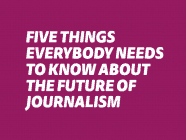Latvian journalism has only had two decades in which to grow up. Most East European countries had to develop fast after emerging from Soviet Union control. The media systems of these new nation states have gone in very different directions. Some have turned into prosperous, liberal systems such as in Estonia where journalists work autonomously, others are still searching for their role in these post-Soviet times. This study looks at Latvia.
Ainars Dimants, Editor-in-Chief of the European Journalism Observatory’s Latvian office, Chairman of the National Electronic Media Council and a communications professor at Turiba University, Riga, has analyzed the prospective of free and independent journalism in the Baltic state in a new paper. He stresses the importance of reforms to ensure the political independence of newsrooms and calls for public broadcasters to be allowed to do their job. He also wants better journalism schools, to give journalists a more professional training.
Polls by the wire service LETA show that the public’s trust in mass media is shrinking steadily. Between May 2011 and October 2012, radio, television and press in Latvia have lost 12, 11 and 8 percentage points respectively: not surprising when considering how dependent the nation’s media outlets are on their owners. In his paper Dimants cities the changing nature of the nation’s formerly largest newspaper, Diena which tended to ally itself with important public figures. It was a strong supporter of reigning Prime Minister, Andris Skele until 2001, but its partisan stance meant that readers no longer trusted it to be a reliable source of news.
Sweden’s Bonnier Group took control of the newspaper for a while, but eventually pulled out, uneasy with its biased stance.Under its new owners, the newspaper is again a mouthpiece for Latvia’s oligarchy.
The funding of media outlets by politicians is another threat to journalistic independence and according to Dimants, is only leading to the “instrumentalisation of other economic and political goals”. An example of such is the television network, Pirmais Baltijas kanāls, which broadcasts content from its sister network, Pervyj kanal, in Moscow and covers the Baltic states from a Russian angle.
This kind of biased reporting may be a reason for a fall in advertising revenue. The Latvian mass media advertising market shrank by 46 percent in 2009 and by another 13 percent in 2010. In 2011, advertisers spent five percent more, but mainly in online advertising.
Dimants believes Latvian media will only have a future if it delivers better content in order to stay competitive in the now international online news market. He argues that readers still reward good content and praises the success of the news magazine, ir, which was started in 2011 by former Diena employees. The publication carries out independent investigative and political reporting and is transparent about who its shareholders are and about the ethical codes it works with. It has acquired a large number of readers who pay for access to their online content.
According to Dimants, the Latvian media also needs better-educated journalists, who can organize themselves, and be more self critical about their profession. It also needs to establish professional associations or publications that focus on the media, journalism and research. Professionalization, Dimants says, is key. By simply embracing its principles, the Latvian media landscape would begin to move in the direction of the Democratic-Corporatist media model: the media system Daniel C. Hallin and Paolo Mancini see as exisiting in Austria, Belgium, Denmark, Finland, Germany, Netherlands, Norway, Sweden, Switzerland.
In recent years the government has tried to reform the media. In February 2012, the National Council for electronic media – which Dimants chairs – was reformed to resemble Western European broadcasting regulatory bodies. Before these reforms, ruling political parties regularly interfered with broadcasters, searching newsrooms or confiscating computers and documents. In Dimants’ opinion, the formation of the Association of Latvian journalists – which appointed an ethical review committee in 2011 – and the foundation of the investigative forum Re:Baltica are further gleams of hope. However, the future of the Latvian media landscape seems to be up in the air, as Dimants states, “The results of these politics remain to be seen.”
Article translated by Tobias Jochheim from the original German An der Grenze zum hörigen Journalismus
Photo Credit: txd / Flickr
Tags: Journalism, Latvia, LETA, Media Developments, Media landscape, post-communist Eastern Europe, Post-Communist Transition










































